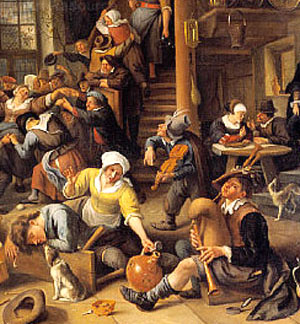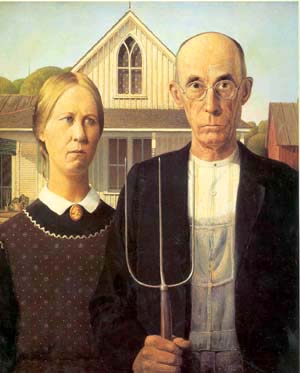 |
Ambiences and Tendencies
The Lutheran and Calvinist Mentalities
Plinio Corrêa de Oliveira
You know what a plateau de fromages is. It is a plate with many different cheeses served in French restaurants. You can select from Gruyère, Camembert, Brie, Pont-l’Eveque, Chèvre and several other cheeses. There are delicious options for every taste.
Protestantism is a plateau de fromages that offers every kind of abomination instead of good cheeses. It has a different abomination for every psychology and human type. Each person can be tempted by the abomination that is more appealing to him.
The two principal cheeses of this plateau are Lutheranism and Calvinism.
The Lutheran loves the good life
Lutheranism is essentially for persons without a metaphysical or philosophical spirit. It appeals more to materialistic persons who like the things of this world and take great pleasure in them. They do not like to think about death or the reason for being of things.
When a roasted pig is served at the table, a Lutheran enjoys eating it. If he becomes sick from overindulging, he doesn’t care. He asks for some medicine and as soon as he feels better, he is ready to dine again. He is a man who likes life and, to apply a picturesque Italian saying, he is contento d’essere al mondo – happy to be in the world. How enjoyable! How funny! etc. This is the Lutheran.

Night's end in a tavern - Jan Steen |
Luther himself was like this: A fat man who loved eating and drinking. After he had preached his heresy for a long time, he retired and went to live in Wittenberg. Every night he used to go to a tavern in the city where the small notabilities of the city gathered. He was the center of the circle. Usually the night would end in drunken revelry with Luther in such a bad state that he would be brought home on a stretcher.
The Calvinist rejects pleasures
Different from this, there is another type of Protestant who has a philosophical bent that went astray and made him acrimonious. He is bitter about life. A Calvinist sees the roasted pig on the table and instead of eating it, he thinks: “O, death! What a terrible thing! One day I will be eaten by worms just as I now eat this pig. It is true that today this pig provides a feast for me, but tomorrow I will be the feast for worms. Is this life worth living?”
Then, he looks with rage at the roasted pig and thinks: “Why should I eat it? The pleasure that I will have eating this pork – which the fool thinks is so delicious – is just a part of the general suffering of living. This morning I awakened already ill-humored thinking about the bad things I foresaw would happen this day. I live in a normal state of irritation because I don’t understand the meaning of the things that take place before my eyes. On the other hand, my health is not that good. If I eat this pork and do not feel well, I will be annoyed at my bad stomach that is unable to digest the meat.”

Calvin epitomizes the bitterness of his sect |
So, for him there are no pleasures. Pleasures are a kind of bribe that God places amid the never-ending bothers of life to fool us. He slips a few transient pleasures into a massive mountain of anguishes. Then, the Calvinist revolts against this “fraud” and rejects all pleasures.
To have the least possible number of problems and bothers, he arranges a calm and well-planned life. Therefore, he makes money in order to not lack any of the basic necessities. He follows a diet so he will not be sick. He has only a handful of friends so as not to be asked for too many favors. His aim is a calm life; within that calmness, tedium; and within the tedium, bitterness.
He doesn’t bother anyone, and he doesn’t want anyone to bother him. He had to work hard to have what he has. So, he thinks that everyone who does not have the same did not want to work or recklessly spent his money. Goodness and mercy? None. Those who lack the necessities of life are lazy vagabonds. He despises those who come to ask him to open his door: “Mon ami Pierrot, ouvre moi ta porte” (1). His normal way of being is to have his heart, hand, pocket, and door closed.
He pays his taxes and thinks that the government should be the one in charge of charities. It should efficiently distribute the tax monies to those vagabonds we call the poor and those useless people we call the sick. It is good for the government to do this so that these people will not revolt and disturb his calm life.
The rest of his life is bitterness.
Now, let us analyze the picture of a Calvinist father and daughter on an American farm. It is entitled American Gothic and was painted by Grant Wood in the 1940s.
Here you have two persons who have reached the age of maximum egoism, that is, the age of retirement, when a person turns off the last faucets of generosity. Napoleon used to say that becoming an adult, a person becomes venal. I would add that most persons become inexorable and closed to generosity when they become elderly. This is the age when the Calvinist mentality achieves its highest expression.

American Gothic by Grant Wood |
You see that behind them in the picture is a building that is probably the farm house, but it has the air of a Calvinist chapel, with a gothic arched window on the second floor. It is a simple wood-structure house without any special beauty, without any ornamental element that reflects joy.
Observing the man, you see that he is the type who sees a roasted pig and thinks of death. He is calm, stable, without any joy or any hope, anxious, but with his problems resolved. He has a certain logic and a certain persistence. In his work he normally finishes each chore he sets himself to do. He holds a pitchfork in his hand, a tool to pitch alfalfa and straw, as if it were a commander’s baton. He seems completely indifferent to his daughter.
You can note his bitter mouth, the sagging flesh on his face that reveals not the least possibility of a smile, an act of courtesy, or an act of mercy or hope. He is the typical man who is not contento d’essere al mondo [glad to be in the world]; he is devoured by poorly resolved metaphysical problems.
His apparel is work clothing that seems to be clean: he wears a shirt without a collar, a pair of overalls, and a jacket. He holds his fork as if to say: “I work, that is what counts, and I resolved my problems through my own effort.” It reflects the great role of work for the Calvinist – they have a kind of adoration for it. For him work produces money, which produces security and prevents more bothers in life.
If you turn your eyes to his daughter, you see that she has a face simultaneously anxious, despairing, and stable. She is more afflicted than he. She finds her support in him, just as he finds his on the fork. It is a trilogy. The fork – the work – is what gives equilibrium to both.
Since she is a woman, she presents herself a bit better. There is a white collar on the black dress she wears under the brown-flowered pinafore. She has placed a modest cameo at her collar, which gives her a small touch of elegance. Her dress looks like the clothing of some Protestant sects. Her hairstyle is also that of a Protestant sister.
You can picture then after having attended a dry Protestant worship service. They return home, speaking little, to a meal that she had already prepared. They eat with almost no exchange of words, and then head for their chairs. She sits for just a short while because she needs to resume her mania for cleaning everything. These people often have a mania for neatness. So, she goes chasing mosquitoes all day long.
In the evening they have a cold snack and retire sadly for sleep. The next morning, a great relief: they go to work again. It is the only thing that gives them a little joy. All the rest is sadness.
This is the lack of sanctity of Calvinism, the leprosy that is Calvinism.
1. Prof Plinio is referring to a popular French children’s song that tells of a person who knocks on the door of a friend’s house to borrow things: “My friend Pierrot, open your door to me. … Lend me your pen because I need to write a word … Lend me your candle because I am needing light … Lend me your match … etc”

Posted November 9, 2006

Related Topics of Interest
 Nobility and Accessibility: Keys of Catholic Charity Nobility and Accessibility: Keys of Catholic Charity
 Fast Food Is Protestant Fast Food Is Protestant
 Eating Alone with Catholic Manners Eating Alone with Catholic Manners
 St. John Nepomucene's Fight Against Protestantism St. John Nepomucene's Fight Against Protestantism
 St. Philip Neri - Vigilant against Protestantism St. Philip Neri - Vigilant against Protestantism
 The New Mass is Protestant The New Mass is Protestant
 Did Brother Schutz Convert from Protestantism? Did Brother Schutz Convert from Protestantism?
 R-CR in the Tendendies, Ideas and Facts R-CR in the Tendendies, Ideas and Facts

Related Works of Interest
|
|
Ambiences | Cultural |
Home | Books | CDs
| Search | Contact Us
| Donate

© 2002- Tradition in Action, Inc. All Rights Reserved
|
 |

|